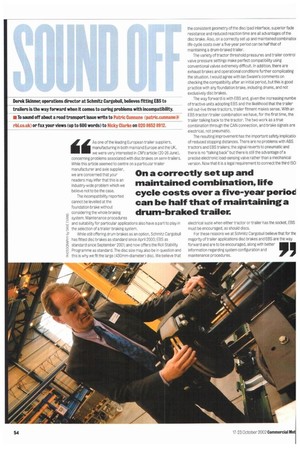dd As one of the leading European trailer suppliers,
Page 54

If you've noticed an error in this article please click here to report it so we can fix it.
manufacturing in both mainland Europe and the UK, The incompatibility reporteo cannot be levelled at the foundation brake without considering the whole braking system. Maintenance procedures and suitability for particular applications also have a part to play in the selection of a trailer braking system.
While still offering drum brakes as an option, Schmitz Cargobull has fitted disc brakes as standard since April 2000; EBS as standard since September 2001; and now offers the Roll Stability Programme as standard. The disc size may also be in question and this is why we fit the large (430mm-diameter) disc. We believe that the consistent geometry of the disc/pad interface, superior fade resistance and reduced reaction time are all advantages of the disc brake. Also, on a correctly set up and maintained combinatior life-cycle costs over a five-year period can be half that of maintaining a drum-braked trailer.
The variety of tractor threshold pressures and trailer control valve pressure settings make perfect compatibility using conventional valves extremely difficult. In addition, there are exhaust brakes and operational conditions further complicating the situation. I would agree with Ian Swann's comments on checking the compatibility after an initial period, but this is good practice with any foundation brake, including drums, and not exclusively disc brakes.
The way forward is with EBS and, given the increasing numbe of tractive units adopting EBS and the likelihood that the trailer will out-live three tractors, trailer fitment makes sense. With an EBS tractor/trailer combination we have, for the first time, the trailer talking back to the tractor. The two work as a true combination through the CAN connection, and brake signals are electrical, not pneumatic.
The resulting improvement has the important safely implicatia of reduced stopping distances. There are no problems with ABS tractors and EBS trailers; the signal reverts to pneumatic and there is no "talking back" but there is still the advantage of a precise electronic load-sensing valve rather than a mechanical version. Now that it is a legal requirement to connect the third ISO electncal suzie when either tractor or trailer has the socket, EBS must be encouraged, as should discs.
For these reasons we at Schmitz Cargobull believe that for the majority of trailer applications disc brakes and EBS are the way forward and are to be encouraged, along with better information regarding system configuration and maintenance procedures.
































































































































































